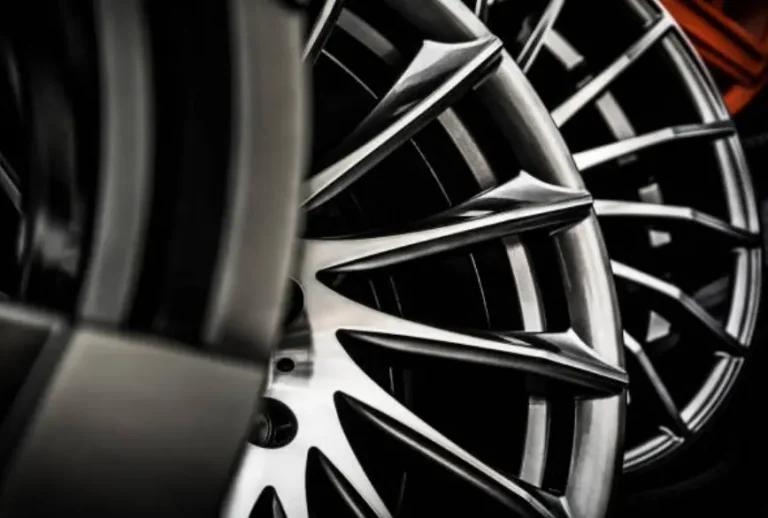When it comes to alloy wheels, performance and functionality play a role that can be affected by various factors. The knowledge of these aspects can assist you in making an informed choice between 16 inch and 17 inch alternatives.
Size and Weight Considerations
The dimensions and mass of alloy wheels play a role in how a vehicle handles on the roadways. Smaller wheel sizes like 16 inches tend to be lighter compared to ones. This decrease in weight can result in acceleration and more agile maneuverability thanks to reduced rotational inertia. Conversely, the larger 17 inch wheels may offer grip by providing a broader surface area that makes contact with the road. This can enhance stability while turning, could potentially lead to higher fuel usage because of the extra weight they carry.
Material Composition and Design
The construction and design process of alloy wheels plays a role in their performance during use. Typically crafted from aluminum and magnesium alloys for their robust properties the specific elements of the design such, as spoke patterns and rim depth can influence their aerodynamic efficiency and ability to facilitate brake cooling effectively. Selecting a high-quality wheel from a brand like Vesteon guarantees that it meets global standards for construction quality.
How Do 16 16-inch alloy Wheels Perform in Terms of Handling?
Studying how 16-inch alloy wheels perform gives us an understanding of when they are best suited for various driving scenarios.
Performance Characteristics
16 inch alloy wheels are commonly preferred for their ability to provide a mix of comfort and performance benefits. Their smaller size enables a sidewall height in tires that can better absorb bumps in the road compared to larger rims, with low profile tires. This characteristic helps maintain a ride while also ensuring good traction when driving enthusiastically.
Pros and Cons of 16-inch Wheels
Choosing 16-inch wheels has its benefits and drawbacks.
- Pros: Enhanced comfort due to greater tire cushioning, potentially lower cost compared to larger sizes, and improved fuel efficiency from reduced weight.
- Cons: May not provide as much visual appeal or sporty aesthetics as larger wheels; potentially less precise handling at high speeds compared to lower-profile tires on bigger rims.
For those seeking OEM wheels, understanding these trade-offs is crucial in aligning your choice with your driving preferences and vehicle requirements.
How Do 17-inch Alloy Wheels Compare?
When you’re looking at 17 inch alloy wheels, make sure to think about how they compare to ones in terms of handling capabilities.
Performance Characteristics
17 inch alloy wheels are crafted to provide cornering performance thanks to their larger size. They usually fit tires with shorter sidewalls that can enhance lateral stability and steering accuracy. However, this can lead to a compromise in ride comfort as shorter sidewalls may transfer road noise and vibrations inside the car.
Pros and Cons of 17 Inch Wheels
Selecting 17-inch wheels requires considering aspects.
- Pros: Improved traction and stability from wider tires; enhanced aesthetic appeal; potential for better braking performance due to increased surface area.
- Cons: Higher cost compared to smaller sizes; increased unsprung weight may affect acceleration; reduced ride comfort over rough surfaces.
Taking into account these factors in addition to how you drive can help you decide whether the advantages of a wheel are worth any possible disadvantages. To find high quality options that adhere to standards of excellence, think about checking out offerings from Vesteon.
Are 17-inch Alloy Wheels a Better Option for Enhanced Handling?
Performance Characteristics
When you observe the performance of 17-inch alloy wheels in world driving scenarios and road conditions; you’ll see that their larger size offers certain advantages in enhancing how your vehicle navigates corners and maneuvers efficiently while driving. Typically designed to fit tires, with sidewalls; these wheels can lead to improved stability during sharp turns and faster reactions when steering your vehicle effectively. This setup can be quite useful when you’re driving at speeds and need to have precise control of your vehicle on the road. However, it’s worth noting that choosing this option may impact the comfort of your ride as the shorter sidewalls may not absorb road bumps effectively and could lead to higher levels of noise and vibrations, within the car.
Pros and Cons of 17 Inch Wheels
Choosing 17 inch wheels requires an evaluation of the advantages and disadvantages.
- Pros: The increased traction and stability from wider tires can enhance overall handling performance. Additionally, these wheels often provide a more aggressive aesthetic appeal and may contribute to improved braking efficiency due to a larger contact area with the road.
- Cons: On the downside, 17-inch wheels generally come with a higher price tag compared to their smaller counterparts. The added unsprung weight might also impact acceleration negatively, and the ride comfort could be compromised on uneven surfaces.
If you’re looking into top notch choices that meet standards, well worth checking out the products from Vesteon. A well known brand in crafting high end alloy wheels.
How to Choose Between 16 Inch and 17 Inch Alloy Wheels?
Assessing Your Driving Needs
Deciding between 16 inch and 17 inch alloy wheels should begin by considering your individual driving requirements foremost. If you value comfort and good fuel efficiency for your commute or road trips covering long distances, then 16 inch wheels could be the better choice because they offer a more comfortable ride with taller tire sidewalls. On the other hand, if you are looking for improved handling performance and a stylish appearance for enthusiastic driving or use on the track, the advantages of 17 inch wheels might outweigh any drawbacks they may have.

Consulting with Experts
Connecting with experts in the field can offer advice customized to your vehicle’s needs and the way you drive it. Getting input from professionals can help you understand how various wheel sizes affect your suspension system and overall performance of your vehicle. Whether you’re thinking about custom wheels, sticking with OEM ones, seeking advice from experienced individuals can help you make a well-informed decision that suits your performance objectives and budget considerations.
In summary, whether you opt for the enhanced comfort of 16-inch alloy wheels or the superior handling capabilities of 17-inch options, understanding your personal preferences and driving conditions will guide you toward the most suitable decision. Explore alloy wheel selections from reputable manufacturers like Vesteon to ensure quality craftsmanship that meets your expectations.
What Role Does Vehicle Compatibility Play in Wheel Selection?
When choosing wheels for your car or truck, it’s important to take into account how well they fit with your vehicle. The decision between 16 inch and 17 inch wheels can make a difference in how your vehicle drives and handles.
Manufacturer Recommendations
Car companies usually give advice on the wheel sizes for their car models to ensure they perform well and last long while keeping you safe. It’s important to follow these recommendations because they consider things like suspension design and brake clearance that affect how the car handles. For instance, some cars work better with wheels that’re the same, as the ones it came with from the factory.
Customization Options
When it comes to your car’s look and performance, customization options go beyond what the manufacturer suggests can help you match your ride to your style and needs better. Whether it’s switching up the size of your wheels from 16 inches to 17 inches, for a sleeker appearance and improved handling or making tweaks, it’s crucial to check that these changes won’t mess with how your car drives or its safety features. When seeking advice on aftermarket choices for your vehicle, it’s helpful to consult with professionals or trusted suppliers such as Vesteon to ensure compatibility.
Conclusion: Making an Informed Decision on Wheel Size
Deciding between 16 inch and 17 inch alloy wheels requires balancing factors such as performance on the road and overall appearance with regards to handling ease and cost implications in mind, well as taking into account suggestions from manufacturers and potential customization options to help you choose the right fit for your driving style and taste preferences.
Weighing the Trade-offs
When weighing the pros and cons of wheel sizes, take into account how each choice fits with your needs and preferences.
- 16-inch Wheels: Prioritize comfort and fuel efficiency for everyday driving scenarios. They offer a smoother ride due to taller tire sidewalls while potentially being more cost-effective.
- 17-inch Wheels: Opt for enhanced handling capabilities and aesthetic appeal if performance is a priority. These wheels provide improved traction and stability but may come at the cost of reduced ride comfort over uneven surfaces.
By examining these aspects and consulting professionals as needed, you can choose the right wheel size that suits your vehicle bests. Check out alloy wheel choices from reputable brands, such as Vesteon, to secure top notch products that adhere to performance benchmarks and fit your preferences effectively.

